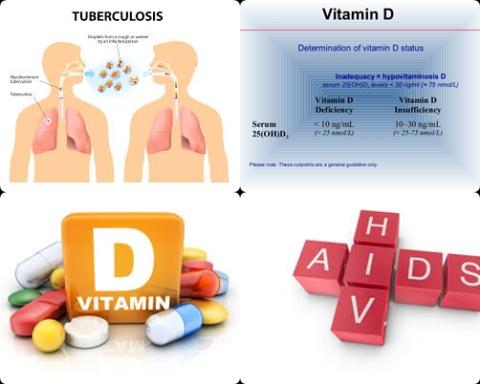
Objectives:
Numerous observational studies have also documented lower serum vitamin D levels among tuberculosis patients compared to healthy controls and prior meta-analyses investigating the association between vitamin D and tuberculosis have concluded that low vitamin D increases tuberculosis disease risk. However, most studies were cross-sectional studies and assessed vitamin D status after the diagnosis of active tuberculosis disease, rather than the impact of preexisting vitamin D levels on the risk of progression to tuberculosis disease. Given tuberculosis disease can induce profound metabolic abnormalities, it is unclear whether vitamin D deficiency increases tuberculosis disease risk or whether underlying tuberculosis infection or disease leads to decreased serum 25-(OH)D levels. Therefore, this review article (meta-analysis) has been conducted.
Does vitamin D deficiency increase risk of tuberculosis?
Study design:
This review article included 7 studies (3 prospective cohort studies, 2 nested case-control studies and 2 prospective case-cohort studies) with a total of 456 tuberculosis cases among 3,544 participants from 13 countries: Brazil, The Gambia, Haiti, India, Malawi, Pakistan, Peru, South Africa, Spain, Tanzania, Thailand, US and Zimbabwe.
The median time to tuberculosis diagnosis from enrolment was 151.0 days (IQR 44.0-342.0 days).
The majority of the participants (86.5%) were over 15 years of age.
Results and conclusions:
The investigators found in the pooled analysis, vitamin D deficiency (serum 25-(OH)D levels 50 nmol/L) significantly increased risk of tuberculosis with 48% [age, gender, BMI and HIV status adjusted OR = 1.48, 95% CI = 1.04-2.10, p = 0.03].
The investigators found in the pooled analysis, severe vitamin D deficiency (serum 25-(OH)D levels 25 nmol/L) non-significantly increased risk of tuberculosis with 105% [OR = 2.05, 95% CI = 0.87-4.87, p trend for decreasing 25-(OH)D levels from sufficient vitamin D to severe deficiency = 0.02].
The investigators found among 1,576 HIV-positive patients, vitamin D deficiency conferred a 2-fold [age, gender, BMI and HIV status adjusted OR = 2.18, 95% CI = 1.22-3.90, p = 0.01] increased risk of tuberculosis and the age, gender, BMI and HIV status adjusted OR for severe vitamin D deficiency compared to sufficient vitamin D was 4.28 [95% CI = 0.85-21.45, p = 0.08].
The investigators concluded low serum 25-(OH)D levels were associated with increased risk of future progression to tuberculosis disease in a dose-dependent manner and that the risk of tuberculosis disease is highest among HIV-positive individuals with severe vitamin D deficiency. Randomized control trials are needed to evaluate the possible role of vitamin D supplementation on reducing tuberculosis disease risk.
Original title:
Vitamin D status and risk of incident tuberculosis disease: A nested case-control study, systematic review, and individual-participant data meta-analysis by Aibana O, Huang CC, […], Murray MB.
Link:
https://www.ncbi.nlm.nih.gov/pmc/articles/PMC6738590/
Additional information of El Mondo:
Find more information/studies on meta-analyse/adjusted OR, food fortification/malnutrition and vitamin D right here.